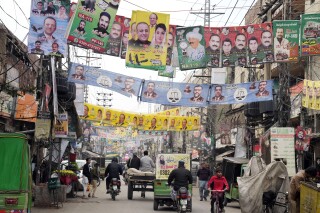Pakistan’s election was controversial and dirty, with no clear winner but lots of uncertainty.

Party banners of election candidates from political parties are displayed on a street ahead of Feb. 8 general elections in Lahore, Pakistan, Saturday, Feb. 3, 2024. (AP Photo/K.M. Chaudary)
DATE OF ELECTION
February 8
TYPE OF ELECTION
Parliamentary
WHO’S RUNNING
No political party won a big enough majority to form a government. The Election Commission slapped legal barriers on candidates from ex-premier Imran Khan’s party, forcing them to run as independents. They secured the biggest number of parliamentary seats, despite numerous challenges. But they’ve ruled out a coalition, claiming that electoral theft deprived them of the votes needed to come out on top. Khan’s rivals, Nawaz Sharif and Bilawal Bhutto-Zardari, are also in the race to govern Pakistan. They’re likely, but not guaranteed, to team up and woo parliamentarians for a coalition
WHY IT MATTERS TO THE WORLD
Voting day was overshadowed by allegations of vote-rigging, an unprecedented countrywide mobile phone shutdown, the exclusion of Khan and an hours-long delay in announcing the results. The turnout was around 47%, lower than the previous election in 2018. The disputed result means the incoming administration will have to add public disillusion and division to their to-do list. Pakistan needs a strong and stable government to fix the economy, address the cost-of-living crisis and tackle militancy. But the country is unlikely to get that because there’s so much political infighting and personal grievances at play.
For more on the Pakistani elections click here
To see how other 2024 elections could affect the world, click here
